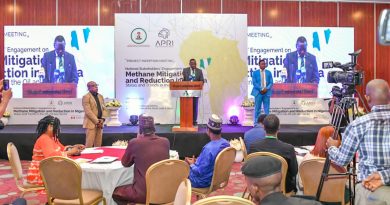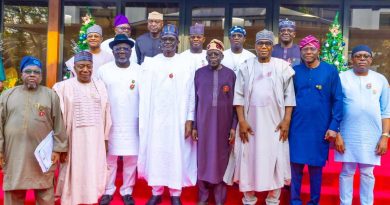2024 World Desertification And Drought Day: Minister Warns Against Over Cultivation, Bush burning, Over grazing To Ensure Food Security, Improved Biodiversity
Land, a very critical but limited natural resource is under great pressure exerted by the increasing demand for food, energy, fiber, housing and other infrastructural facilities as a result of the rapid population growth and human contest. The over exploitation of land through over cultivation, overgrazing, deforestation and other unsustainable land use practices has resulted in land degradation, deforestation and drought which is now being exacerbated by climate change. As a result, daring consequences including reduction in land productivity, food insecurity, ecosystem services inadequacy, water scarcity, loss of livelihoods forced migration and resources use conflicts is being faced in many parts of the world including our country, Nigeria. These statements were made today, June 26, 20224 by Dr. Iziaq Adekunle Salako, the Honourable Minister of State for Environment at the commemoration of the 2024 World Desertification and Drought Day (WDDD).
World Desertification and Drought Day is a special day set apart globally to promote public awareness on the menace of drought and desertification, and to encourage participation, strengthen cooperation, promote collaboration among all stakeholders and share knowledge on best practices to tackle these environmental issues thus driving the message across the society including the grassroots. Recall that the World Desertification and Drought Day event is commemorated globally on the 17th June of every year but in view of the public holiday in Nigeria within the period, the commemorative activities had to be shifted to allow for greater participation. This year also marks the 30th anniversary of United Nations Convention on Combating Desertification, the sole legally binding international treaty on land management and drought. The theme for the 2024 WDDD is United for Land: Our Legacy. Our Future.

Salako said this year’s theme is speaking to shared responsibility, inclusive participation, collaboration, partnership and greater commitment of all segments of the society in land stewardship for a sustained and better future. Land, a very critical but limited natural resource is under great pressure exerted by the increasing demand for food, energy, fiber, housing and other infrastructure facilities as a result of the rapid population growth and human contest.
He said over exploitation of land through over cultivation, overgrazing, deforestation and other unsustainable land use practices has resulted in land degradation, deforestation and drought which is now being exacerbated by climate change. As a result, daring consequences including reduction in land productivity, food insecurity, ecosystem services inadequacy, water scarcity, loss of livelihoods forced migration and resources use conflicts is being faced in many parts of the world including our country, Nigeria.
“Globally, landscapes are degrading at an alarming rate, pushing million species towards extinction and mounting economic toll, including on the farming sector. Unsustainable practices, from the way we build cities to the way we grow food is harming our planet and our livelihoods, but paradoxically also impeding our ability to feed the people. Available statistics indicates that: 1/5 of the earth’s land area including more than half of all agricultural land is degraded. More than 12 million ha of land is lost each year to desertification, land degradation and drought globally. 24 billion tons of fertile soil is being lost globally due to dry-land degradation.
“According to the UNCCD, in Nigeria it is estimated that about 350,000 hectares of arable lands are lost to desertification annually and over 35% of our total land areas covering the dry-lands are under serious threat of desertification. This calls for an urgent and more proactive measures to protect our land, conserve our ecosystems and combat desertification, land degradation. This is very essential if we are to ensure food security, improve biodiversity, increase forest cover, mitigate climate change and enhance livelihoods in line with the priority agenda of President Bola Ahmed Tinubu”, the Minister stated.

He said the Federal Government remains concerned about the disruption of ecological system caused by poor land use and uncontrolled mining activities with the dire consequence of land degradation. To this end government has adopted regional programmes such as the Great Green Wall Sahel Sahara Initiative (GGWSSI), African Forest Restoration (AFR100) program and Land Degradation Neutrality which aims at providing long-term solutions to desertification, land degradation and drought.
Recognizing the direct linkages between Land Degradation Neutrality and our national development programme and priorities in the area of poverty, food security, environmental protection and sustainable use of natural resources, President Bola Ahmed Tinubu GCFR, according to Salako, has directed that Nigeria continues to build synergies between relevant ministries to mainstream the agenda into all policies for both national and sub-national government. He said the Federal Ministry of Environment working with line ministries and agencies will continue to work in this direction by emphasizing the transformative power of sustainable land management to address today’s national challenge and create a blue print to a better future on land for all generations. To achieve this, he solicited for public support especially through attitudinal changes in monitoring, managing and utilizing the nation’s natural resources.
Part of the changes the Minister advocated for include developing and carrying out production activities in harmony with nature and avoiding over cultivation, bush burning, over grazing, and other unsustainable land practices that have severe impacts on the environment. Reclaiming, restoring and rehabilitating degraded land and ecosystem as well as adopting sustainable land management practices, smart agricultural practices and agroforestry also needed to be carried out.
He also mentioned that adopting afforestation and reforestation programme is important as well as avoiding deforestation and degradation of forest resources. Salako enjoined all of us to plant at least 10 trees annually and avoid cutting down trees except it is extremely necessary. He added that the administration of Bola Tinubu would continue to encourage an inclusive commitment to good land stewardship by open and inclusive cooperation and synergy among all stakeholders, sharing policies, knowledge, best practices, information and technology.

He said land restoration is everybody’s business since we all depend on land. He called on the states and local governments, community based organizations, NGOs, the youth, women organizations, farmers, the academia, students, and the entire society to rise up to the challenge and unite to put a halt to the degradation of our limited land resource. He said we need to work together to restore and rehabilitate our degraded land in the face of the increasing population and climate change impacts, for sustainable growth and development not just for ourselves but also for future generations.
The Minister appreciated President Bola Ahmed Tinubu GCFR for always leading from the front when it comes to issues of sustainable environmental practices, conservation and equitable access to the resources of the nation. He added that Mr. President without fail has repeatedly demonstrated his passion for climate actions to achieve a sustainable future for all in line with the sustainable development goals.
While recognizing and appreciating those who partnered with the ministry in today’s event, especially The ACReSAL Project, University of Abuja, Energy Commission of Nigeria, Federal Ministry of Power, National Conservation Foundation (NCF) and the Center for Journalism Innovation and Development (CJID), the Minister encouraged them to continue to unite for our land because it is fundamental to our survival and economic growth.




